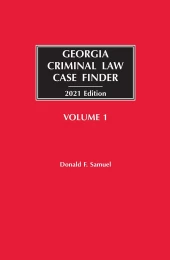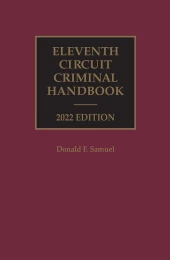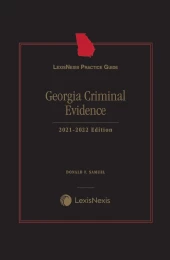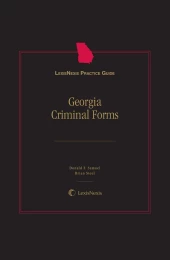Publications Don Samuel's Books and Law Review Articles are Relied on by Judges, Prosecutors and Lawyers Throughout the Country.
-

Georgia Criminal Law Case Finder
Purchase BookSmart Georgia attorneys know that for fast access to criminal case law, you can’t beat Georgia Criminal Law Case Finder. This indispensable resource can save you hours of tedious searches through massive case reporters and digests. Offering more than 7,000 annotations the Georgia Criminal Law Case Finder lets you find instantly the authorities you can use to support your case. Whether your interest is procedural or substantive, Georgia Criminal Law Case Finder gets you straight to the case summary you need – without having to wade through a long and confusing index. Written by Don Samuel, the former President of the Georgia Association of Criminal Defense Lawyers, Georgia Criminal Law Case Finder arranges case summaries in chronological order under topical headings for ready reference.And unique to such references, Georgia Criminal Law Case Finder separates many of the cases into those favorable to the defense and those favorable to the prosecution. Thus, in dozens of topics involving searches of cars, or the admissibility of similar transaction evidence, or the sufficiency of the evidence, or the legality of an arrest, the Case Finder divides cases into pro-prosecution and pro-defense cases. For example, virtually every case in Georgia in which a search was found to be illegal is readily identified. Similarly, every case in which an appellate court held that similar transaction evidence was improperly admitted, is listed. This same “taxonomy” applies to dozens of topics that are frequently litigated.
-

The Fourth Amendment
Purchase BookIn this treatise, Don Samuel has canvassed virtually all the United States Supreme Court, Eleventh Circuit, and Georgia appellate court decisions that address Fourth Amendment issues, including search warrants, warrantless searches, car stops and searches, wiretaps, computer searches, arrests, Terry stops, and the exclusionary rule. This one-volume book covers every issue, substantive and procedural in the area of searches and seizures from a lawyer-in-the-courtroom perspective.
-

Eleventh Circuit Criminal Handbook
Purchase BookThis comprehensive handbook by Don Samuel is an encyclopedic compendium of every topic in the Eleventh Circuit’s criminal law jurisprudence. Covering hundreds of criminal issues, the Eleventh Circuit Criminal Handbook gives criminal attorneys, prosecutors, defense attorneys, and judges clear, practical analysis tailored to the needs of a busy criminal law practitioner. The Handbook is updated annually and includes:
- U.S. Supreme Court decisions in the area of criminal law for the past forty years through the 2023 term;
- Search & Seizure law;
- Scores of recent Eleventh Circuit decisions on Sentencing Guidelines and developing sentencing jurisprudence;
- Evidence Issues, including a lengthy discussion of the recent Supreme Court’s Confrontation Clause cases;
- The law governing guilty pleas;
- Recent cases on mail fraud, health care fraud, mortgage fraud, money laundering and drug offense prosecutions.
-

Georgia Criminal Evidence
Purchase BookThis practice guide provides both analysis and guidance that is key to successfully managing your evidence practice for criminal cases.
-

Georgia Criminal Form Book
Purchase BookThis volume, published by Lexis Law Publishing, contains over 150 forms tailored for a criminal defense practice. Unlike the typical Form Book that provides only skeletal guidance in preparing forms or motions in a criminal case, the forms included in this volume are detailed and include practice tips that highlight the strategic considerations in filing certain motions, deadlines and service requirements. The forms themselves include all relevant case law that supports the relief requested in the motion. Don co-authored this volume with Brian Steel.
-

Federal Favorable and Noteworthy Decisions
Download the Word DocThis 1,500 page treatise, Don has accumulated over 6,000 cases from all twelve federal courts of appeals and the United States Supreme Court that are favorable to the defense. Virtually every topic of criminal law is covered, including scores of substantive offenses (including lengthy sections on drug cases, bank fraud, money laundering, mail fraud, health care fraud); search and seizure law (over 250 pages of favorable cases in the topic of the Fourth Amendment); confessions; evidence issues; ineffective assistance of counsel; motions; pretrial procedure; guilty pleas and every other topic of criminal law.
-

Federal Criminal Trials
Purchase BookFederal Criminal Trials is the definitive treatise on federal criminal procedure, trial rules and proceedings, and constitutional protections, including an in-depth look and analysis of both the Federal Rules of Criminal Procedure and Federal Rules of Evidence as well as post-trial proceedings and appeals. This is the only treatise which covers in a single volume criminal issues relating to constitutional protections, the Federal Rules of Criminal Procedure and Federal Rules of Evidence. This treatise is also a valuable asset to state practice, particularly in those states which have adopted both the Federal Rules of Criminal Practice and Evidence.
-

Who Should Guard the Attorney-Client Privilege When Documents Are Seized by Law Enforcement?
Read ArticleThe prosecution seizes computers from a business and included in the digital files are hundreds of communications with lawyers. The prosecution executes a search warrant at a law firm and seizes hundreds of files. The prosecution seizes a suspect’s cell phone and there are texts and emails to and from a lawyer. How can the defense ensure that the attorney-client privilege is protected? How can the court make sure the prosecutors and the law enforcement agents do not look at privileged communications? Typically, the answer to these questions involves the use of a “filter team.” In this article, Don Samuel and Scott Grubman examine the protocols of filter teams and the strategies that lawyers may use to protect the confidentiality of communications with their clients that are now in the hands of law enforcement.
-

The Truth, the Whole Truth and Nothing But the Truth—Well … Not Exactly. Trial Attorney Ethical Problems
Read ArticleOn a daily basis, criminal defense lawyers are confronted by ethical decisions. What takes precedence: the duty of candor to the court or the duty to zealously represent the client and maintain the confidentiality of the client’s communications? What should the lawyer do if a client brings physical evidence of the crime to the lawyer’s office? When, if ever, is it ethical (or even required) to fail to correct the record when a witness says something false in court? In this article, Don Samuel and Amanda Clark Palmer pose some of the most difficult questions to a group of lawyers, prosecutors, judges, and law professors and learn that these professionals’ suggestions are wildly diverse not only among each of the other respondents, but also among their cohorts.
-

Parallel Proceedings
Read ArticleIt is not unusual for alleged criminal conduct to result not only in a criminal prosecution, but also a civil case. For example, a serious car accident may result in a vehicular homicide prosecution, as well as a civil lawsuit by the alleged victim’s family. In a white-collar crime prosecution in federal court, a parallel SEC civil lawsuit may be filed. This article traces the complicated strategic decisions that need to be made when a client is faced with parallel criminal and civil cases. When should the defendant invoke his Fifth Amendment right to remain silent? Should the defendant move to “stay” the civil case? Should the defendant aggressively use the discovery tools available in the civil case to gain a tactical advantage in the criminal case?
-

The Money Laundering Control Act of 1986: Will Attorneys be Taken to the Cleaners?
Read ArticleThe Money Laundering statutes, 18 U.S. §1956 and §1957 were enacted in 1986. These statutes outlaw spending “dirty money” (money derived from a criminal offense) for a prohibited purpose, and also make it a federal crime to deposit more than $10,000 of dirty money into a bank. Though simply stated, the laws have spawned thousands of decisions in the federal courts about their scope and interpretation. This article, written shortly after the laws were passed, discusses the laws’ impact on lawyers.
Donald F. Samuel
Partner

Don Samuel graduated from Oberlin College in 1975 and the University of Georgia School Of Law in 1980 (cum laude), where he was an editor of the Georgia Journal of International and Comparative Law. He served as a law clerk to United States District Court Judge Harold L. Murphy (N.D.Ga.) following his graduation from law school and then joined what is now known as GARLAND, SAMUEL & LOEB, P.C.

How Can We Help You?
When you hire the law firm of Garland, Samuel & Loeb, you can rely on us to do everything in our power to reach the best possible outcome in your case. Whether you have suffered a serious injury in an accident or are facing criminal charges, our attorneys will fight to see that your rights are protected from the start.














